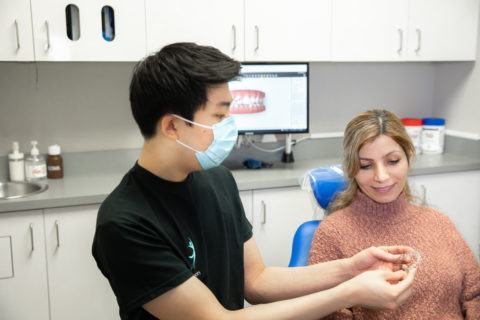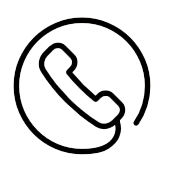
TMJ pain can turn simple daily activities like eating breakfast or having a conversation into uncomfortable experiences. If you’re experiencing jaw pain, clicking sounds, or headaches that seem to originate from your jaw area, you’re likely wondering whether this discomfort will resolve on its own or if you need professional intervention.
Minor TMJ pain may go away on its own with at-home care, but if it doesn’t, many people find significant relief through targeted treatments like Botox, night guards, or orthodontic work. Understanding your options—from lifestyle adjustments to innovative treatments like Botox—can help you make informed decisions about managing your TMJ symptoms.
What Is TMJ?
Temporomandibular joint disorder (TMD), commonly referred to as TMJ, affects the joints that connect your jaw to your skull. These joints work constantly throughout the day as you speak, chew, yawn, and swallow. Many people experience headaches, neck pain, earaches, and even difficulty opening their mouth fully. The clicking or popping sounds that often accompany TMJ can be particularly bothersome in quiet settings. Some people notice their symptoms worsen during stressful periods or after eating chewy foods.
The condition can stem from various causes, including teeth grinding, jaw clenching, arthritis, or injury to the jaw area. Poor posture can also contribute to TMJ problems by placing additional strain on the jaw muscles and joints.
Will TMJ Pain Go Away on Its Own?
Acute TMJ pain following a specific incident, such as opening your mouth too wide or experiencing jaw trauma, may resolve as the tissues heal. Similarly, if your symptoms are primarily stress-related, they might improve as stress levels decrease and you become more aware of clenching habits.
Chronic TMJ pain that persists for weeks or months rarely resolves completely without intervention; it can still be treated, though. But the longer symptoms persist, the more likely they are to become entrenched patterns that require professional treatment.
Self-Care Strategies for TMJ Pain Relief
While professional treatment often provides the most significant relief, several self-care strategies can help manage symptoms at home and complement your treatment plan.
- Dietary Modifications:
- Choose softer foods during flare-ups to reduce jaw muscle strain.
- Cut food into smaller pieces.
- Avoid chewy or hard items like bagels, tough meats, or ice.
- Heat and Cold Therapy:
- Apply a warm compress to sore jaw muscles to promote relaxation.
- Use cold therapy to reduce inflammation during acute flare-ups.
- Gentle Jaw Stretches and Massages:
- Perform gentle stretches and massages, but stop if you feel increased pain.

Professional Treatments for TMJ Pain
The source of your TMJ pain will guide which of these treatments is the best for you.
Botox
Botox has emerged as a highly effective treatment for TMJ pain, offering relief for people who haven’t found success with traditional approaches. This FDA-approved treatment works by temporarily relaxing the overactive muscles responsible for jaw clenching and teeth grinding.
The process involves small injections of botulinum toxin into specific jaw muscles. These injections reduce muscle tension and hyperactivity, which can significantly decrease pain and improve jaw function. Most people notice improvements within a few days to a week after treatment.
What makes Botox particularly appealing for TMJ treatment is its precision and effectiveness. Unlike oral medications that affect your entire system, Botox targets only the specific muscles causing problems. The treatment typically lasts 3 to 6 months, and many people find that their symptoms become less severe over time with repeated treatments.
Custom Night Guards
Custom-fitted night guards can protect your teeth from grinding while reducing strain on your jaw joints. These appliances are significantly more effective than over-the-counter options because they’re designed specifically to fit your bite pattern.
The process involves taking impressions of your teeth to create a guard that fits perfectly and doesn’t interfere with your sleep. Many patients notice a significant reduction in morning jaw pain and headaches after consistently wearing their custom night guard.
Orthodontic & Restorative Solutions
Orthodontic treatment may be recommended if bite alignment issues contribute to your TMJ symptoms. Correcting how your teeth come together can reduce strain on your jaw joints and muscles. Some people benefit from restorative dental work to rebuild worn teeth or replace missing teeth that may be affecting their bite.
When to Seek Professional Help for TMJ
If you experience persistent pain that interferes with eating, speaking, or sleeping, it’s time to consult with a dental professional.
Progressive worsening of symptoms, despite self-care efforts, suggests that underlying issues need professional attention. If you’re experiencing frequent headaches, neck pain, or ear pain alongside jaw symptoms, such as difficulty opening your mouth fully or episodes of jaw locking, a comprehensive evaluation can help determine whether TMJ is the root cause.
Don’t wait until symptoms become severe before seeking help. Early intervention often leads to better outcomes and may prevent the need for more intensive treatments later on.
Taking Control of Your TMJ Pain
TMJ pain doesn’t have to control your life. While mild symptoms may occasionally resolve on their own, most people benefit significantly from professional treatment approaches. Modern options, such as Botox, offer effective and minimally invasive solutions that can provide lasting relief.
At Markham Dental, we understand how TMJ pain affects your daily life, and we’re committed to helping you find the relief you deserve. Our comprehensive approach combines treatments like Botox with traditional dental care and lifestyle guidance to address your unique needs. Book online with us today.
Contact details
Markham Dental General and Cosmetic Dentistry
8241 Woodbine Ave, Unit 17, Markham, ON L3R 2P1
Email: [email protected]
In Case of Emergency Call
(365) 659-4701
To schedule an appointment, please fill out the adjacent form.
Book An Appointment

Book your appointment online!




